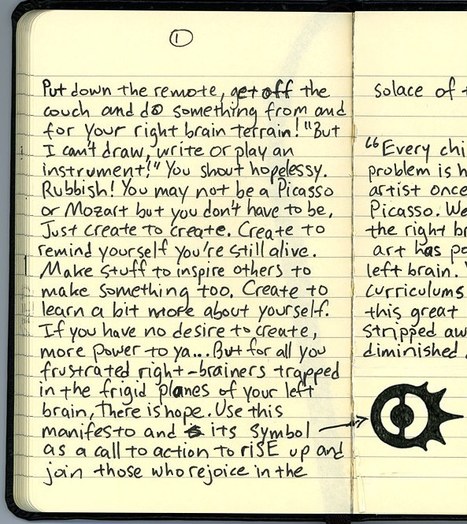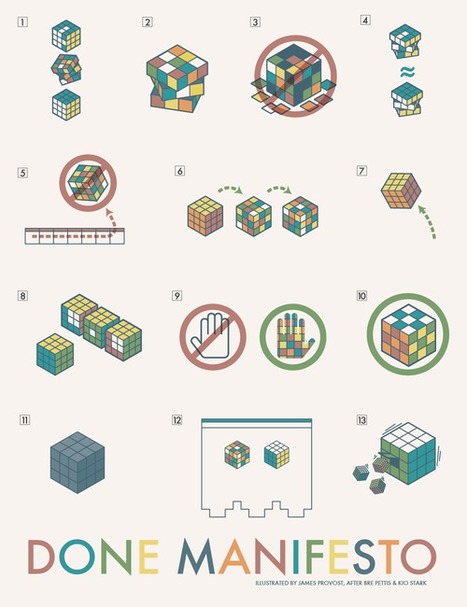 Your new post is loading...
 Your new post is loading...
"When American education is in crisis, policy makers and thought leaders roll out the STEM argument, that the science, technology, engineering and math curriculum needs to be emphasized as the cornerstone of American competitiveness in a world where Chinese students do lightening drills on the periodic table of the elements at age 4 (lol).
There is certainly no question that STEM education and STEM skills are a vital part of this country’s edge, but many educators would argue that STEM is missing a key set of creativity-related components that are equally critical to fostering a competitive and innovative workforce, and those skills are summarized under the letter “A” for Arts.
Two years ago, the Conference Board and Americans for the Arts, in association with the American Association of School Administrators (AASA), conducted a survey of executives and school superintendents. The study, called Ready to Innovate, demonstrated that more and more companies are looking for skill sets in their new employees that are much more arts/creativity-related than science/math-related. Companies want workers who can brainstorm, problem-solve, collaborate creatively and contribute/communicate new ideas.
And, interestingly, the study shows that managers are finding a dearth of creative workers trained in these “A” skills. So why is this not part of the overall national debate?
STEM should be amended to STEAM, an idea that has been kicking around with many people in the creative industries for a few years now, and became a key discussion point of the Americans for the Arts 2007 National Policy Roundtable where the Ready to Innovate study was first unveiled."
"Join me Tuesday, August 28th, for another live and interactive FutureofEducation.com webinar with Tony Wagner, this time on his latest book, Creating Innovators: The Making of Young People Who Will Change the World. Tony recently accepted a position as the first Innovation Education Fellow at the Technology & Entrepreneurship Center at Harvard. Prior to this, he was the founder and co-director of the Change Leadership Group at the Harvard Graduate School of Education for more than a decade. Creating Innovators is a "provocative look at why innovation is today’s most essential real-world skill and what young people need from parents, teachers, and employers to become the innovators of America’s future" (from the publisher catalog).
Date: Tuesday, August 28th, 2012
Time: 5pm Pacific / 8pm Eastern (international times here)
Duration: 1 hour
Location: In Blackboard Collaborate (formerly Elluminate). Log in at http://futureofed.info. The Blackboard Collaborate room will be open up to 30 minutes before the event if you want to come in early. To make sure that your computer is configured for Blackboard Collaborate, please visit the support and configuration page.
Recordings: The full Blackboard Collaborate recording and a portable .mp3 audio recording will be available after the interview at http://www.futureofeducation.com.
Mightybell Discussion and Resource Space: https://mightybell.com/spaces/3d0f0836f5a57871# (includes links to Tony's website and the main book website, as well as the ability to add or comment on other resources)."
"Khan Academy released their Introduction to Programming modules today and they're really great. Go play. Here are my favorite pieces: Changes to the code affect the output dynamically. No rendering, no compiling, no reloading. Change the width parameter of a rectangle in the code and the rectangle changes without any extra effort on your part. You can hover your mouse over any parameter and a slider appears, letting you change that parameter smoothly over a range of values. (Bret Victor modeled this kind of programming environment in his Inventing on Principle talk. Try it out on the tree generator.) Contrast this with Codeacademy where you have to click "Run" or press "Enter" to see the result of your work. Or just now, when I was working on my front-end web development final project, I would make a change to my code in one window, click over to my web browser in another, and then click "Reload" to see the result. That friction may not sound like much but it often makes programming feel less creative and more mechanical."
"Leaders who want to foster innovation should ask themselves these questions:
1. In my quest for the next big innovation, have I overlooked smaller incremental innovations that could still have a big impact on customer experiences or on employee productivity?
2. Do I reinvest my spare capacity into expanding my own knowledge, exploring future trends and learning from others? Or does my focus on performance and results preclude any consideration of unproven innovations?
3. Am I doing one thing every day that scares me? How much time do I spend pushing my own boundaries and working at the limits of my competence, where the next great innovations are most likely to be discovered?"
"YOU CAN DO IT...
'If I [Frederic Terral] can do it, so can you.' That’s what I’ve been preaching to friends and colleagues since I started this terrain. Late nights, early mornings and sacrificed weekends is what it takes, but the rewards offset the inconveniences. So many of these crazy talented folks are dissatisfied with their professional lives so I wrote The Manifesto to be that annoying 'you can do it' voice in the background. The Manifesto also gets a bit preachy about the sacrifice of the arts in our schools, because as a father of little ones I want them to master their A-B-Cs and 1-2-3s AND their Red-Green-Blues and E-A-D-G-B-Es. This page also features links to right brain propaganda and right-brainers I revere. The links will continue to evolve indefinitely so check back periodically."
Via BrainPickings.org
1. There are three states of being. Not knowing, action and completion.
2. Accept that everything is a draft. It helps to get it done.
3. There is no editing stage.
4. Pretending you know what you're doing is almost the same as knowing what you are doing, so just accept that you know what you're doing even if you don't and do it.
5. Banish procrastination. If you wait more than a week to get an idea done, abandon it.
6. The point of being done is not to finish but to get other things done.
7. Once you're done you can throw it away.
8. Laugh at perfection. It's boring and keeps you from being done.
9. People without dirty hands are wrong. Doing something makes you right.
10. Failure counts as done. So do mistakes.
11. Destruction is a variant of done.
12. If you have an idea and publish it on the internet, that counts as a ghost of done.
13. Done is the engine of more.
Via BrainPickings.org
"Jailbreak verb. 1 To get out of a restricted mode of operation. 2 To enable use of a product not intended by the manufacturer.
Currently, the degree is the only meaningful “unit” of education to which employers give any credence. Of this dependency, TIME magazine writes, “The tight connection between college degrees and economic success may be a nearly unquestioned part of our social order. Future generations may look back and shudder at the cruelty of it… It is inefficient, both because it wastes a lot of money and because it locks people who would have done good work out of some jobs.”
The traditional degree, with its four-year time commitment and steep price tag, made sense when the university centrally aggregated top academic minds with residency-based students. Education required extensive logistics, demanding deep commitment from students worthy of being rewarded with the all-or-nothing degree."
"This classic 25-word definition pares entrepreneurship to its essence and explains why it's so hard. And so addictive. As an entrepreneur, you surely have an elevator pitch, the pithy 15-second synopsis of what your company does and why, and you can all but repeat it in your sleep. But until recently, I’d never seen a good elevator pitch for entrepreneurship itself—that is, what you do that all entrepreneurs do? Now I've seen it, and it comes from Harvard Business School, of all places. It was conceived 37 years ago by HBS professor Howard Stevenson. I came across it in the book Breakthrough Entrepreneurship (which I highly recommend) by entrepreneur and teacher Jon Burgstone and writer Bill Murphy, Jr. Of Stevenson’s definition, Burgstone says, 'people often need to say it out loud 50 or 100 times before they really understand what it means.' Here it is: 'Entrepreneurship is the pursuit of opportunity without regard to resources currently controlled.'"
"In the spirit of personal kaizen, I [Garr Reynolds] have listed below a few books that I read (or reread) over the past year that you may want to read as part of your own continuous improvement journey."
"Keep the faith. That's what I said to a client who is going through a crisis of confidence. Over the summer he had put together the underpinnings of what on paper looked like a promising growth business. But — as is usually the case — the more he analyzes, the more he doubts; the more he shows the results of his analysis to senior leaders, the more questions they ask, and the more they doubt.
If you are doing something that hasn't been done before, careful analysis will by definition highlight reasons to not proceed. Market demand can't be validated. Experts dismiss technological assumptions. Partnership discussions stall. There is always something that causes this crisis of confidence. Harvard Professor Rosabeth Moss Kanter has seen this so frequently that she coined Kanter's Law: Everything can look like a failure in the middle. When you first formulate an idea, excitement peaks. But the more you study that idea, the more you realize the challenges that lie in front of you."
At Google X, a clandestine lab that many employees do not know exists, engineers and robotics experts are tackling a list of 100 shoot-for-the-stars ideas that eventually might not seem so far-fetched.
"In a top-secret lab in an undisclosed Bay Area location where robots run free, the future is being imagined.
It’s a place where your refrigerator could be connected to the Internet, so it could order groceries when they ran low. Your dinner plate could post to a social network what you’re eating. Your robot could go to the office while you stay home in your pajamas. And you could, perhaps, take an elevator to outer space."
Native sons have gone from working for Western companies to running Indian companies that are offering solutions to India’s problems.
"All these schools, plus 600 million cellphones, plus 1.2 billion people, half of whom are under 25, are India’s hope — because only by leveraging technology and brains can India deliver a truly better life for its masses. There are a million reasons why it won’t happen, but there is one big reason it might. The predicted really is happening: India’s young techies are moving from running the back rooms of Western companies, who outsourced work here, to inventing the front rooms of Indian companies, which are offering creative, low-cost solutions for India’s problems. The late C.K. Prahalad called it “Gandhian innovation,” and I encountered many examples around New Delhi."
George Couros
This summer, I wrote a post discussing the world of social media, and how our administrators need to jump in and lead our schools in this “new world”. Here is one of the things that I wrote in that post:
"There can no longer be an “opt out” clause when dealing with technology in our schools, especially from our administrators. We need to prepare our kids to live in this world now and in the future. Change may feel hard, but it is part of learning. We expect it from our kids, we need to expect it from ourselves."
Last weekend, I was disheartened (as many were) reading a Matt Gomez post on the end of Facebook in his Kindergarten classroom (you should really read it and the comments). The first thing I thought when reading it was, “Seriously, he is using Facebook with his Kindergarten students?” I was shocked because I did not really understand how he would be doing this, but I continued to read on. Here is where the post really got my attention...
|
"When information is ubiquitous and free, and when basic education is available to billions of people worldwide, only one set of skills can ensure this generation's economic future - the capacity for innovation.
What are the skills of innovators? Why is innovation so critical to America’s future—and to the future of the planet? What must parents, teachers, mentors, and employers do to develop the capacities of many more young people to be the innovators that they want to be—and that we need them to become? What do the best schools and colleges do to teach the skills of innovation? What are some of the most forward-looking employers doing to create a culture of innovation?
Creating Innovators: The Making of Young People Who Will Change The World addresses these questions through in-depth profiles of young innovators and the adults who have made a difference in their lives, as well as vivid descriptions of innovation-driven classrooms and places of work."
Suzie Boss provides 8 tips for turning K-12 classrooms into innovation spaces. How can we prepare today’s students to become tomorrow’s innovators? It’s an urgent challenge, repeated by President Obama, corporate CEOs, and global education experts like Yong Zhao and Tony Wagner. Virtually every discussion of 21st-century learning puts innovation and its close cousin, creativity, atop the list of skills students must have for the future. 1. Welcome authentic questions 2. Encourage effective teamwork. 3. Be ready to go big. 4. Build empathy. 5. Uncover passion. 6. Amplify worthy ideas. 7. Know when to say no. 8. Encourage breakthroughs.
Via Barbara Bray
Peggy Sheehy speaks as her avatar, Maggie Marat, about exploring identity in virtual spaces.
The reshaping of the modern workplace also involves new approaches to innovation. Here, executives at Google, General Electric and DreamWorks Animation summarize their companies’ paths to creativity.
We need to start envisioning our teachers as knowledge generators and creative professionals whom we trust to innovate and implement unorthodox ideas that might transform teaching and learning. The time has come to reward innovation among our best and most creative teachers. They should be given the time and resources to reflect on their practice, experiment with new ideas, and implement strategies to more effectively engage learners.
Via Peter John Baskerville, Gust MEES
"Advances in artificial intelligence could cause a big change in the way we interact with our devices over the coming year says one of Intel's experts." "...I think in 2012 we will start to see signs of change in our relationships with devices. Here I do not just mean more forms of new interfaces and new interactions. This is less about gesture and voice recognition and more about machines that are contextually and situationally aware. .... Creativity
I think this means we can look forward to our interactions with digital devices maturing into something more like a relationship, and a little less like a lot of hard work.
Of course, some of that is a little way off. In the meantime, we have other things to look forward to. The last couple of years have seen a lot of devices to help us download and consume media content. Those have been great and have clearly found a place in many of our homes and backpacks. And there is surely more to come, as we all still like a good story. But I think 2012 might be a year in which our desire to make things, and not just consume things, really blossoms."
"'4 Generations' is a film short documenting my journey in southwestern China (near Tibet) to first find, then deliver a water buffalo to a poor family. The water buffalo led us to a family with an phenomenal story. Inspired and donated by author, educator, and founder of photo.net, Philip Greenspun."
"Downloading — quite often stealing, in the eyes of the law — music, movies, books and photos is easier than bobbing for apples in a bucket without water. It has kept legions of lawyers employed fighting copyright violations without a whole lot to show for their efforts in the past decade.
You think that was bad? Just wait until we can copy physical things.
It won’t be long before people have a 3-D printer sitting at home alongside its old inkjet counterpart. These 3-D printers, some already costing less than a computer did in 1999, can print objects by spraying layers of plastic, metal or ceramics into shapes. People can download plans for an object, hit print, and a few minutes later have it in their hands.
Call it the Industrial Revolution 2.0. Not only will it change the nature of manufacturing, but it will further challenge our concept of ownership and copyright. Suppose you covet a lovely new mug at a friend’s house. So you snap a few pictures of it. Software renders those photos into designs that you use to print copies of the mug on your home 3-D printer.
Did you break the law by doing this? You might think so, but surprisingly, you didn’t."
|



 Your new post is loading...
Your new post is loading...



























